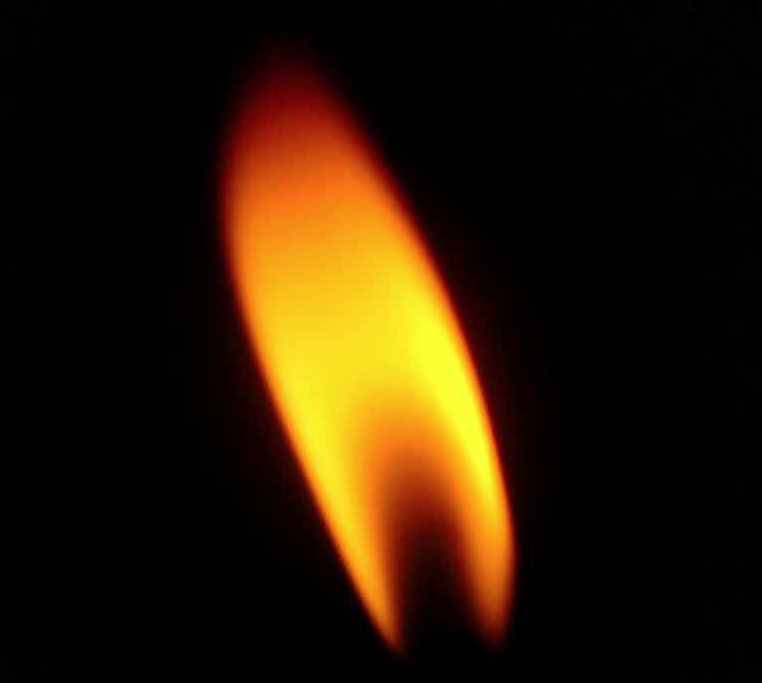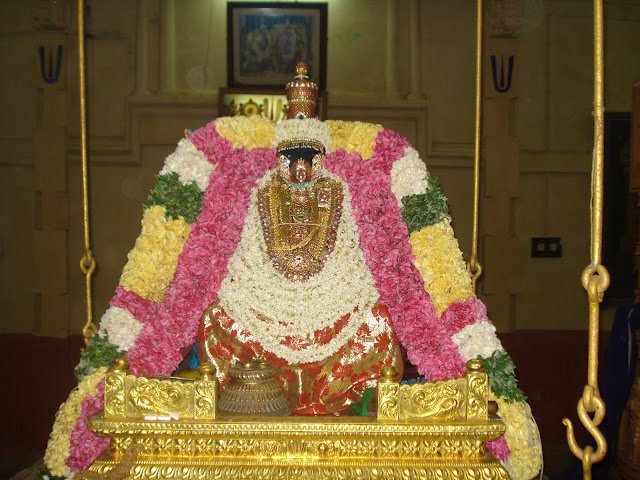The SatadUshaNi is an important classic of Visishtadvaita Vedantha composed by Swami Desikan, in which as the title suggests, one hundred philosophical issues have been chosen for systematic criticism directed against the school of Advaita. Previous parts of this article can be read from: http://anudinam.org/tag/satadushani/
Continuation..
Is Consciousness Eternal?
The next issue to be considered is whether consciousness is eternal. The Advaitin’s conception is that consciousness is unproduced because its prior non-existence is neither known by itself nor through another consciousness. Vedanta Desika rejoins that the prior non-existence of knowledge is apprehended through itself as well as through another knowledge. Thus, the following cognition, ‘l was not aware of anything all this time’, apprehends its non-existence in the previous state. The competent non-cognition (yogyanupalabdhi) is the pramana in support of the cognition of prior non-existence of knowledge as well as of any other object.” It may be asked as to how the non-cognition which is past is helpful in establishing the prior non-existence of an object. This is possible, replies Vedanta Desika, because of the absence of recollection of the cognition of the object. If knowledge were present during ,deep sleep, we should have had its cognition in so far as it is capable of being known (yogya) and consequently we should have had a recollection of it soon after waking from sleep.
 But there is no remembrance of it after waking up from sleep and this proves the non-existence of knowledge during deep sleep. It cannot he said that the non-recollection is due to the extinction of the samskara or latent impression. Only such factors as intense pleasure, intense pain and long interval are capable of extinguishing the samskara and in the absence of these it is absurd to speak of its extinction. Nor can it be argued that deep sleep itself extinguishes the samskara. If that were the case there would be no recollection of what was experienced on a previous day.
But there is no remembrance of it after waking up from sleep and this proves the non-existence of knowledge during deep sleep. It cannot he said that the non-recollection is due to the extinction of the samskara or latent impression. Only such factors as intense pleasure, intense pain and long interval are capable of extinguishing the samskara and in the absence of these it is absurd to speak of its extinction. Nor can it be argued that deep sleep itself extinguishes the samskara. If that were the case there would be no recollection of what was experienced on a previous day.
The prior nonexistence of knowledge is also cognised through another knowledge. This is possible since knowledge can be the object of another knowledge. If one’s knowledge were not the object of cognition ol’ another, there would be an end to all empirical usages depending on speech. We come to know of the non-existence of knowledge by means of inference. In fact, it is on the basis of the presupposition of the absence of knowledge about a particular fact, we proceed to instruct a person on it. Again, when a preceptor teaches his pupil, he does it on the .supposition that the pupil does not possess the knowledge of that which is taught to him. This absence of the particular knowledge of a thing or fact is the prior non-existence or the praghabhava of knowledge. This is known, as has been explained, by means of knowledge. The prior non-existence of knowledge of the future which exists in one-self is known through competent non-cognition, while the prior non-existence of knowledge of the past is known through recollection or by means of inference.
Thus, it is possible to prove the non-existence of knowledge and in view of that it is not logically unintelligible to hold that consciousness is originated. As regards the contention that consciousness is eternal and therefore it is neither produced nor destroyed, it is pointed out that destruction and origination are possible even though consciousness is eternal. Origination and destruction arc the particular states of consciousness. When knowledge allows through the channel of sense organs to the object and it apprehends the object, knowledge becomes produced. When the knowledge of the object ceases to exist, it is destroyed. Thus, the author of the Sri-bhasya says, “In view of the expansion and contraction of knowledge through the sense organs, there is the designation of orignation and destruction ”. In so far as these states do not affect in any way the essential nature of consciousness, consciousness even though it be eternal, admits both a beginning and an end.
Is Consciousness Immutable?
On the basis of the foregoing conclusion Vedanta Desika proceeds to refute the theory that consciousness is not subject to transmutation. Since knowledge is originated, it is futile to argue _on that ground that it does not undergo any transmutation.
In the judgment ‘knowledge is nirvikara‘, what does the term nirvikara mean? It can be understood in three ways, It may mean not having an upper limit or in other words, not being subject to destruction (uttara-vadhi-rahityam). Secondly, it may mean, which is a more appropriate sense, the mere absence of particular states which are named differently (avasta-visesa-rahityam). Lastly, the word nirvikara may even refer to the absence of mere transformation (avasthamatra rahityam). Vedanta Desika contends that in none of these senses it is possible to understand the immutability of consciousness. Taking the first alternative, the argument put forth by the Advaitin becomes inconclusive in respect of avidya. Avidya, according to the Advaitin, is not originated and yet it has an end since it is removed by right knowledge. It cannot be argued that avidya itself is illusory and hence its destruction too is illusory. For the Advaitin even the destruction of the pot is illusory and there would be nothing which could be truly regarded as having an end or destruction. In view of this it would not be possible to prove the negative con comitance (Vyatireka-Vyapti) viz., whatever has an end has a beginning. If the destruction of the pot has an empirical reality, this is true of avidya as well. Nor can the Advaitin argue that what is implied by the probandum is the absence of real end (paramartha Vikara). For there is no object which can be regarded by him as having a real end. To overcome this difficulty the syllogism may be expressed in a d1H`erent form: “Consciousness does not have an end which is absolutely real, because it is unoriginated; whatever is unoriginated does not have an end that is absolutely real, as for example avidya”.
 Even this does not solve the difficulty, contends Vedanta Desika. The syllogism suffers from the defect of the non-established probandum. The absence of an end that is absolutely real, which is the probandum of the syllogism, is a non-existent for the Advaitin. If he admits such a thing, it would lead to the denial of one’s own theory (apasiddhanta) .The second alternative is also untenable because the argument is inconclusive in respect of avidya. The Advaitin himself maintains that avidya which is unoriginated transforms itself into different states that are designated as mahat, ahamkara etc. Consciousness also assumes different states known as smriti, anubhuti etc. This is proved by experience and it would be difficult to deny them. It cannot be said that the different states of consciousness are illusory in character because for the Advaitin there is no such state that is truly real.
Even this does not solve the difficulty, contends Vedanta Desika. The syllogism suffers from the defect of the non-established probandum. The absence of an end that is absolutely real, which is the probandum of the syllogism, is a non-existent for the Advaitin. If he admits such a thing, it would lead to the denial of one’s own theory (apasiddhanta) .The second alternative is also untenable because the argument is inconclusive in respect of avidya. The Advaitin himself maintains that avidya which is unoriginated transforms itself into different states that are designated as mahat, ahamkara etc. Consciousness also assumes different states known as smriti, anubhuti etc. This is proved by experience and it would be difficult to deny them. It cannot be said that the different states of consciousness are illusory in character because for the Advaitin there is no such state that is truly real.
For the same reason the third alternative is not valid. It also results in the denial of one’s own theory. The Advaitin himself admits illusory transformation in respect of consciousness. If this were not admitted, the illusion of the universe the need to overcome it and for this purpose of study of the sacred texts would all be meaningless. The Visistadvaitin also admits that Brahman is unoriginated and immutable. Nevertheless the criticisms leveled against the Advaitin do not apply to his own theory. The Visistadvaitin does not say that the knowledge which is evident to ordinary experience, which admits changes in the form of origination and destruction and which is the attribute of the self, is identical with Reality (Brahman). Nor does he accept that the transcendental consciousness devoid ot` a substrate and unrelated to objects is Brahman. According to the Visistadvaita Vedanta, Reality is a qualified entity. Brahman is associated with chit and Achit, the sentient individual selves and the non-sentient matter. The changes such as origination and destruction belong to the latter, and these do not in any way affect Brahman. Brahman is no doubt omniscient but His knowledge is not subject to contraction and expansion, unlike the knowledge of the individual self. It is in this sense that the immutability or nirvikaratva of the Reality is understood in the Visistadvaita system. In other words, the concept of immutability is intelligible in respect of a qualified Brahman but not in the case of a transcendental consciousness which is identical with Reality. Vedanta Desika, therefore, concludes that it is impossible to establish by means of reasoning that consciousness is immutable. In fact, consciousness, as is evident from our ordinary experience, assumes different states which are called by such names as anubhuti, smriti, buddhi etc. All these are synonymous with jnana or knowledge. These cannot be dismissed aside as false states of consciousness.
to be continued….










v narayanan says anudinam dailynews andnew programes arevery good gain knowledge and acharyas are num vazikattupavargal